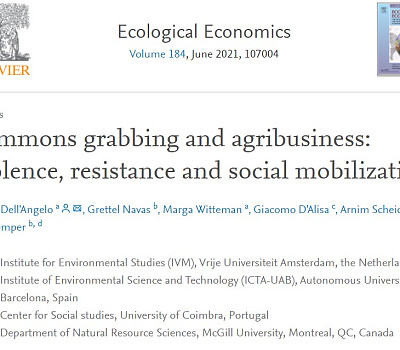Article Review | Commons Grabbing and Agribusiness: Violence, Resistance and Social Mobilization by Dell’Angelo et al. (2021)
Review
The importance of large-scale land acquisitions (LSLAs) has been increasingly recognized due to their numerously evidenced relationship with the “contemporary global agrarian transition” (Dell’Angelo et al., 2021, p. 12) and LSLAs’ inclination to target the commons. Several scholars focus on this process, also known as “commons grabbing”. In particular, the majority of literature addresses the social conflicts which emerge as a result of LSLAs. Nevertheless, the question of specific repertoires of social mobilization remains understudied. This is the gap that Dell’Angelo et al. (2021) fill in with their most recent publication.
The recently published article by Dell’Angelo et al. (2021) centers around the issue of commons grabbing and the forms of social mobilization that arise in response to it. Offering a systematic synthesis of the relevant scholarship, the publication identifies the diverse dynamics of mobilization in response to commons grabbing, particularly in the context of global agribusiness expansion. Relying on data from the Environmental Justice Atlas (EJAtlas), the authors provide a comprehensive overview of 185 land acquisition conflict cases from diverse locations. The results uncover not only the specific repertoires of action, but also the types of actors involved in mobilization processes, the origins of the activity, and the types of outcomes emergent from the mobilization among others.
According to the analyzed data, groups that tend to mobilize in LSLAs-related conflicts most commonly include “local EJOs (69%); indigenous groups (66%); farmers (66%); and neighbors, citizens communities (36%)” (Dell’Angelo et al., 2021, p. 5). Two other key groups are women and landless peasants – 20% and 18% of examined cases respectively. Among these groups, the preferred repertoires of action include alliance building with NGOs and International Organizations (65%); official letter and petition campaigns (59%); street protests (51%); development of support network (42%); and alternative reports and knowledge creation (41%).
Furthermore, Dell’Angelo et al. (2021) scrutinize the outcomes the mobilizations have led to. The four most frequently observed outcomes are “repression (37%); migration and displacement (35%), violent targeting (32%), and criminalization of activists (32%)” (p. 6). These findings underscore the prevalence of violence in the context of commons grabbing, also reflected in the previous work of Dell’Angelo et al. (2017). Nevertheless, the publication simultaneously highlights the positive political change and the creation of alternatives to the exploitative processes of commons grabbing that could be brought about by reactive processes aimed at defending common-pool resources.
Read the full article here
This article has been co-authored by NEWAVE's Coordinator, Principal Investigator, and Supervisor, Prof. Jampel Dell’Angelo.
References:
- Dell’Angelo, J., D’Odorico, P., Rulli, M.C., Marchand, P., 2017. The tragedy of the Grabbed Commons: Coercion and Dispossession in the Global Land Rush. World Development 92, pp. 1–12. https://doi.org/10.1016/j.worlddev.2016.11.005
- Dell’Angelo, J., Navas, G., Witteman, M., D’Alisa, G., Scheidel, A., & Temper, L. (2021). Commons Grabbing and Agribusiness: Violence, Resistance and Social Mobilization. Ecological Economics, 184, pp. 1-13. https://doi.org/10.1016/j.ecolecon.2021.107004






